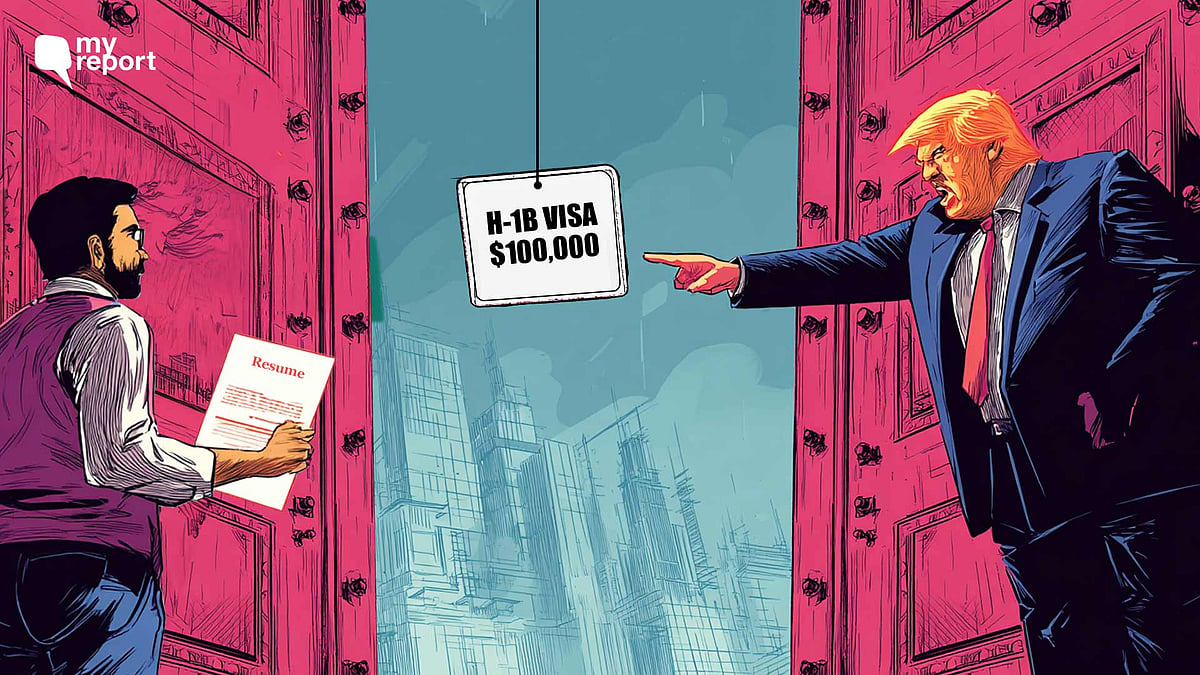
'Took Rs 50L Loan to Study in US, Trump’s H-1B Visa Fee Could Leave Me in Debt'
'With Trump’s $100K H-1B fee, firms see no future in hiring Indian students on F1 visas,' writes an Indian student.

advertisement
The signing of the proclamation by US President Donald Trump, which imposes a $100,000 fee on all first-time H-1B visa applications filed after 21 September, has had the highest impact on the international student community.
It is said that everyone who comes to America also comes with an 'American Dream'. So, even I had a dream to study, work and make a living in the US. But now, it seems that my dream is breaking into pieces.
After completing my BTech, I was working at a private company. After working for two-and-a-half years, I wanted to upgrade myself with an international degree. I applied to multiple nations, and I got admission calls for a Master's from Italy, Sweden, and the US.
'Not From an Affluent Family, Had To Take Loan'
My mother is a nurse at a hospital in South India, and my father, who has completed Class 10, runs a crockery supplies business. I don’t come from an affluent family, so the only way I can pursue my dream of earning an international degree is through a bank loan.
So, I took a Rs 50 lakh loan above the scholarships that I got to fund my education. My greatest fear is that it won't be easy for me to repay the loan if I am forced to leave the US right after my studies.
While the rule change in H-1B is going to hurt many Indians, the ones who will be affected the most are the more than 3 lakh Indian students who have already invested their money to come to the US on student visas, believing that after their studies they would get a job here, secure an H-1B visa, and repay their loans in the process.
Now, to convert my F1 visa to an H-1B, my employer has to apply to the authorities on my behalf—and under the Trump administration’s new rule, companies may be charged $100,000 for this.
There is no clarity on whether H-1B applications will be subject to this visa fee. While some law firms say they won’t, the proclamation signed by Trump and the US Citizenship and Immigration Services website make no mention of it either.
'Trump Made It Hard For Companies To Hire Us'
Any company, before hiring someone, looks at their long-term prospects. If a candidate doesn’t have long-term prospects, why would they hire them?
On an F1 visa, a company can hire a student for a maximum of three years. During the period, the company has to apply for an H-1B visa for the student.
But now that Trump has set the H-1B new visa application fee at $100,000 with no clarity, why would anyone hire us in such a situation?
I still consider myself lucky that my course will finish next year. Many of my seniors who have just graduated are still struggling to secure jobs. With several US companies halting the hiring of international candidates, their options have dried up almost overnight.
Under the F1 visa rules, they have only a 60-day window after graduation to either find employment or enroll in another course. For those who haven’t been able to do either, the clock is ticking, and they are left with no choice but to return to India—not just with a broken dream but with a heavy weight of their study load.
'India Can Go The China Way'
My professor often tells us that not long ago, the majority of international students in US colleges were from China, not India. Today, Indians make up the largest share, but that shift didn’t happen naturally.
China actively incentivised its students to study abroad, supported them through their Master’s and PhDs, and then brought them back to contribute to Chinese universities and industries. That kind of foresight and planning is exactly what India needs to adopt.
And beyond loans, there is the question of livelihood. Even in India, finding a job for local graduates is like searching for a needle in a haystack. For someone returning from abroad with high expectations but little opportunity, the struggle feels endless.
In my view, the Indian government must act on two levels. Immediately, it needs to engage diplomatically with the US to restore the H-1B visa fee to its earlier level of $2,000-4,000 instead of the crushing $100,000 now being imposed.
But beyond that, when we speak of becoming atmanirbhar, we must create real pathways for Indian students abroad to return home with dignity, contribute to upskilling them, and see a future for themselves in India. Otherwise, thousands of us will come back not as contributors, but as those with broken dreams.
(The author is an Indian student studying at Colorado University. Their name has been withheld to protect identity.)
(All 'My Report' branded stories are submitted by citizen journalists to The Quint. Though The Quint inquires into the claims/allegations from all parties before publishing, the report and the views expressed above are the citizen journalist's own. The Quint neither endorses nor is responsible for the same.)
- Access to all paywalled content on site
- Ad-free experience across The Quint
- Early previews of our Special Projects
Published: undefined